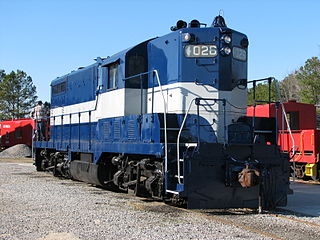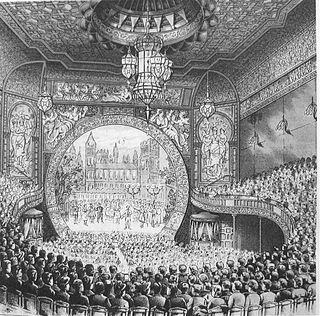
The South Atlantic League, often informally called the Sally League, is a Minor League Baseball league with teams predominantly in states along the Atlantic coast of the United States from New York to Georgia. A Class A league for most of its history, the league was promoted to High-A as part of Major League Baseball's 2021 reorganization of the minor leagues. The league temporarily operated for the 2021 season as the High-A East before reassuming its original moniker in 2022.

Fox Theatres was a large chain of movie theaters in the United States dating from the 1920s either built by Fox Film studio owner William Fox, or subsequently merged in 1929 by Fox with the West Coast Theatres chain, to form the Fox West Coast Theatres chain. Fox West Coast went into bankruptcy and was sold to The National Theatres Corporation, led by Charles Skouras, on November 20, 1933, for $17,000,000.00. Eugene V. Klein later became CEO of National, and turned it into the conglomerate National General. Mann Theatres bought National General's theatres in 1973.
Theatre Owners Booking Association, or T.O.B.A., was the vaudeville circuit for African American performers in the 1920s. The theaters mostly had white owners, though there were exceptions, including the recently restored Morton Theater in Athens, Georgia, originally operated by "Pinky" Monroe Morton, and Douglass Theatre in Macon, Georgia owned and operated by Charles Henry Douglass. Theater owners booked jazz and blues musicians and singers, comedians, and other performers, including the classically trained, such as operatic soprano Sissieretta Jones, known as "The Black Patti", for black audiences.

The Georgia Railroad and Banking Company also seen as "GARR", was a historic railroad and banking company that operated in the U.S. state of Georgia. In 1967 it reported 833 million revenue-ton-miles of freight and 3 million passenger-miles; at the end of the year it operated 331 miles (533 km) of road and 510 miles (820 km) of track.
America's 11 Most Endangered Places or America's 11 Most Endangered Historic Places is a list of places in the United States that the National Trust for Historic Preservation considers the most endangered. It aims to inspire Americans to preserve examples of architectural and cultural heritage that could be "relegated to the dustbins of history" without intervention.

The East Tennessee, Virginia and Georgia Railroad (ETV&G) was a rail transport system that operated in the southeastern United States during the late 19th century. Created with the consolidation of the East Tennessee and Virginia Railroad and the East Tennessee and Georgia Railroad in 1869, the ETV&G played an important role in connecting East Tennessee and other isolated parts of Southern Appalachia with the rest of the country, and helped make Knoxville one of the region's major wholesaling centers. In 1894, the ETV&G merged with the Richmond and Danville Railroad to form the Southern Railway.

The 104th Ohio Infantry Regiment, sometimes 104th Ohio Volunteer Infantry, was an infantry regiment in the Union army during the American Civil War. It played a conspicuous role at the Battle of Franklin during the 1864 Franklin–Nashville campaign, where six members later received the Medal of Honor, most for capturing enemy flags.
This is an incomplete list of historic properties and districts at United States colleges and universities that are listed on the National Register of Historic Places (NRHP). This includes National Historic Landmarks (NHLs) and other National Register of Historic Places listings. It includes listings at current and former educational institutions.
Tessitura is an enterprise application used by performing arts and cultural organisations to manage their activities in ticketing, fundraising, customer relationship management, and marketing. It refers to itself as "arts enterprise software."
Miller-Motte College, formerly Miller-Motte Technical College, is a system of private for-profit technical colleges throughout the southeastern United States. Its parent company is Ancora Education.

The Piedmont Atlantic Megaregion (PAM) is a neologism created by the Regional Plan Association for an area of the Southeastern United States that includes the Atlanta, Birmingham, Charlotte, Memphis, Nashville, Research Triangle (Raleigh-Durham), and Greensboro-Winston-Salem-High Point metropolitan areas. The megaregion generally follows the Interstate 85/20 corridor. According to Georgia Tech, PAM represents over 12 percent of the total United States population and covers over 243,000 square miles (630,000 km2) of land.
A Shakespeare festival is a theatre organization that stages the works of William Shakespeare continually.

The Bijou Theatre (1882–1943) in Boston, Massachusetts, occupied the second floor of 545 Washington Street near today's Theatre District. Architect George Wetherell designed the space, described by a contemporary reviewer as "dainty." Proprietors included Edward Hastings, George Tyler, and B.F. Keith. Around the 1900s, it featured a "staircase of heavy glass under which flowed an illuminated waterfall." The Bijou "closed 31 December 1943 and was razed in 1951." The building's facade still exists. It is currently a pending Boston Landmark by the Boston Landmarks Commission.
The Tennessee Theatre was a 2,028 seat, single screen movie and stage theater at 535 Church Street, in Nashville, Tennessee was opened on February 28, 1952. It was built with the designs of architect Joseph W. Holman in the shell of the 11-story, Art Deco Sudekum Building, also known as Warner building, that was completed in 1932, The theater was demolished in the 1980s. The high rise office building was imploded on November 29, 1992 The Cumberland Apartment high-rise now sits on the site. The theater hosted the first Grammy Awards ceremony not held in either Los Angeles or New York City in 1973 — it would be 49 years until the Grammys were held outside those two cities.
The following is a timeline of the history of the city of Nashville, Tennessee, United States.
Hull Property Group is a shopping mall management company based in Augusta, Georgia. It was founded in 1977. The company owns, manages, and re-develops shopping malls in relatively small communities, mainly in the south and mid-west United States.







